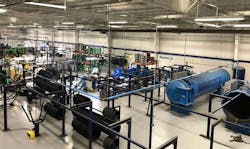Marangoni Continues to Invest in Network, Operations
“Expansion” and “investment” are two words that describe Marangoni Tread North America’s strategy. Marangoni expanded its network by three retreaders during 2019, including Pete’s Road Service, which has 10 outlets throughout southern California. The company also is making significant investments at its tread rubber plant in Madison, Tenn. And its dealers are investing in their own production capabilities.
Marangoni CEO and President Clif Armstrong elaborates on all of the above in this interview. He also discusses how tariffs on low-cost truck tire imports have changed the way fleets look at tire maintenance.
MTD: What’s your take on the current state of the retread market as we prepare to enter the second quarter of the year?
Armstrong: The retread market in the U.S. is positive. In 2019, the implementation of tariffs caused somewhat of an unknown on what was to come. The market has now had enough time to sort through the tariff implementation and how it affects not only the supply of low-cost Chinese imports, but also the overall commercial tire business. MTD: What trends did you observe during the first quarter of 2020 and how did they impact Marangoni’s retread business?
Armstrong: The most positive trend that has emerged for Marangoni is our dealer network is investing in equipment. This is a good sign that retreaders feel better about their commercial business as a whole, and their retread operations, in particular. Over the previous five years, most dealers did not feel confident enough to invest in equipment. Marangoni takes a holistic service approach to the entire retread shop of our dealers. We also are adding technical expertise and manpower to support dealer growth.
MTD: Traditionally, Marangoni has taken a steady approach to expanding its North American network. In 2019 alone, Marangoni signed three retreaders: Pete’s Road Service in California; KCT Retreads, which will sell Marangoni products throughout Texas, New Mexico and Oklahoma; and PRIDE Enterprises in Florida. Is Marangoni accelerating the pace at which it signs new retreaders, and if so, why?
Armstrong: The additions to the Marangoni family of dealers happens for two reasons: the business values of the independent retreader match with the business values of Marangoni and independent retreaders have a strong desire to run their own business, their way, which fits the Marangoni model perfectly. At Marangoni, our goal is to broaden our reach through like-minded independent dealers while respecting our current distribution network. We do not have a set number of dealerships we target each year but continue to seek out opportunities throughout North America. Our philosophy is to make sure the partnership fits both businesses and that by working together, both businesses will find success in the partnership.
MTD: Are there existing geographic gaps that you are seeking to fill, and if so, where are they?
Armstrong: Our dealer network growth is less about where, and more about who. Dealers who are independent and want to remain so and are passionate about the retread products they produce are good fits. Part of our process is working with the dealer and designing their programs to include market coverage discussions.
CTD: In late 2018, Marangoni told MTD that it was planning to expand its tread rubber plant in Tennessee. Can you bring us up to speed on what’s happening at the plant and your near-term plans for it? What is driving increased demand?
Armstrong: Marangoni is investing in our Tennessee plant. In early 2019, we started to assemble our new XL Press. This press is capable of making Ringtread product up to 500 millimeters wide. The first production Madison-made wide-base Ringtread was built in October of 2019. This new press gives us great flexibility to meet the growing demand of not only the over-the-road, wide-base retread market, but also specialty markets, like waste trucks and construction. In addition, we have added capacity by installing four additional Alpha Ring presses.
What impact – if any – are tariffs and ongoing trade tensions with China having on Marangoni’s retread business in the U.S.?
Armstrong: As I see it, the most important thing that the tariff process offered retreading was visibility. The price of low-cost Chinese commercial tires moved upward, and that helps our entire industry. When you look deeper, tariffs have helped fleets focus on better management of their tire assets. Installing a quality new tire program and following that with a quality retread and retread producer saves fleets money.
“The tariffs have now shifted visibility away from low-cost new tire imports to (fleets) taking control of their tire assets and developing a strong retread program,” he adds.
About the Author
Mike Manges
Editor
Mike Manges is Modern Tire Dealer’s editor. A 28-year tire industry veteran, he is a three-time International Automotive Media Association Award winner, holds a Gold Award from the Association of Automotive Publication Editors and was named a finalist for the prestigious Jesse H. Neal Award, the Pulitzer Prize of business-to-business media, in 2024. He also was named Endeavor Business Media's Editor of the Year in 2024. Mike has traveled the world in pursuit of stories that will help independent tire dealers move their businesses forward. Before rejoining MTD in 2019, he held corporate communications positions at two Fortune 500 companies and served as MTD’s senior editor from 2000 to 2010.

